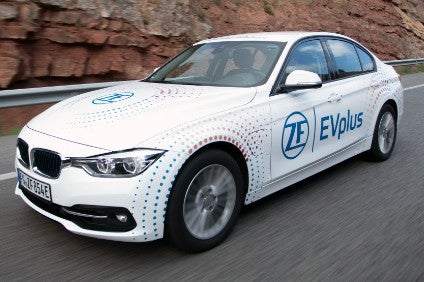
ZF is showing at Frankfurt its BMW-bodied EVplus concept PHEV which is claimed to run 100km (60 miles) under real-life conditions.
This, the supplier reckons, is a sufficient range for most drivers to cover their commuting distances and daily drives on one battery charge. This makes electromobility possible in daily use for a broad group of customers with just one family car. For the more occasional long trips the engine comes into play.

Discover B2B Marketing That Performs
Combine business intelligence and editorial excellence to reach engaged professionals across 36 leading media platforms.
The company justifies the range by claiming, in Germany, 88% of commuters cover daily distances of less than 100km so a PHEV with that range can cover such distance entirely in electric mode without a recharge en route.
“EVplus marks a paradigm change with plug-in hybrids,” said Stephan von Schuckmann, head of the car powertrain technology division.
“The next generation of plug-in hybrids are electric vehicles suitable for daily use.”
The higher electric range delivers zero-emission driving locally on daily routes while the combustion engine removes range anxiety, helping to dispel existing reservations about the purchase of electric vehicles.
ZF thinks PHEV vehicles could rapidly ensure more journeys are covered entirely in electric mode, reducing local emissions of CO2 in road traffic. Another advantage is that significantly smaller batteries can be installed in PHEV vehicles compared to battery-electric vehicles (BEV) to achieve this high proportion of electrically powered journeys.
“EVplus provides consistent electromobility in day-to-day life. Anyone wishing to drive longer distances in the same vehicle can do so without having to stop and wait for it to recharge, with the risk of getting stranded,” ZF said.
The concept is based on a BMW with an eight-speed ZF plug-in hybrid transmission. Engineers have installed a more powerful battery with a gross capacity of 35 KWh in a mid-range sedan.
With 65kW continuous output and peak output of up to 95kW, the power of the electric motor integrated into the transmission is equal to the volume production standard. Under real-life conditions, this enables the ZF concept vehicle to cover a distance of more than 100km purely electrically on a single battery charge at any time of the year and with active auxiliary systems such as air conditioning or heating system.
With the greatly increased range in purely electric mode, user behaviour is also improved, ZF said.
“Often, the drivers of current PHEV vehicles do not even charge the battery to start with. The reason for this is that the purely electric range is not sufficient for day to day life. This adversely affects the actual energy balance of these PHEVs. Things are very different with EVplus: once charged in the garage at home or at work, car drivers can cover a distance of 100km, entirely in electric mode.”
Inner cities can also be accessed in purely electric mode, eliminating local nitrogen oxide emissions and achieving substantially lower fine particulate concentrations.
Soon, appropriate driving strategies and control mechanisms – geofencing – will ensure PHEV vehicles actually run electrically while in cities, ZF said.






